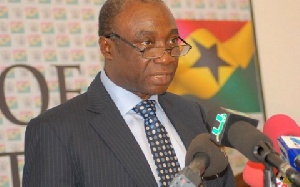 Dr Kwabena Donkor, Former Power minister
Dr Kwabena Donkor, Former Power minister
Former Power Minister, Dr. Kwabena Donkor, has urged Parliament to conduct an inquiry into the termination of the power purchase agreement with the Ghana Power Generating Company (GPGC) by the former Energy Minister, Boakye Agyarko, and other officials of the New Patriotic Party (NPP) administration.
This termination resulted in a judgment debt of $140 million awarded to the Singaporean firm, Trafigura.
In January 2021, Trafigura, the majority owner of GPGC, was granted judgment in an arbitral tribunal held in London, which found that Ghana had unlawfully terminated a contract for the installation and operation of two power plants.
The Ghana High Commission building in the UK, responsible for providing visas and other services, along with the commissioner's residence, the Ghana International Bank building, and other properties, are now at risk of being auctioned to cover this $140 million judgment debt.
The government asserts that the Finance Ministry has taken steps to settle the debt.
However, Ghana's High Commissioner to the United Kingdom, Papa Owusu Ankomah, attributes the default in payment to the government's financial constraints.
The government's decision to terminate the deal in 2017 was based on several grounds, including high tariffs that would cost the state $115,480,000 if implemented.
Illegality due to GPGC's lack of capacity to enter into a Power Purchase Agreement (PPA), failure to obtain citing and construction permits, installation of a used plant against policy, and non-compliance with certain conditions were also cited.
Dr. Donkor contests the validity of these reasons. He argued that the GPGC deal was the most cost-effective and quickest among all the PPAs signed at that time. He believes that the substantial judgment debt that the government must now pay could have been avoided.
"I believe the Ghanaian state should ask the people who took the decision to terminate to tell us why they terminated. I believe that is the route to use if we have to improve our governance. Those who were responsible would have to tell us why they took that decision because, commercially and legally, it doesn't make sense," Dr. Donkor stated.
He further pointed out the energy perspective, emphasising that the termination of the cheapest emergency plant was unjustifiable. He noted that even if the plant was old, the government was aware of it.
Dr. Donkor suggested that Parliament should take the lead in investigating the matter because the executive arm was responsible for the decision to terminate the contract.
He stated, "I believe parliament is the best institution to do that because the decision to terminate was taken by the executive arm, and so you cannot ask the executive arm to investigate it. Ghanaians must know why; we have the right to know."
Ghana’s leading digital news platform, GhanaWeb, in conjunction with the Korle-Bu Teaching Hospital, is embarking on an aggressive campaign which is geared towards ensuring that parliament passes comprehensive legislation to guide organ harvesting, organ donation, and organ transplantation in the country.
NAY/WA